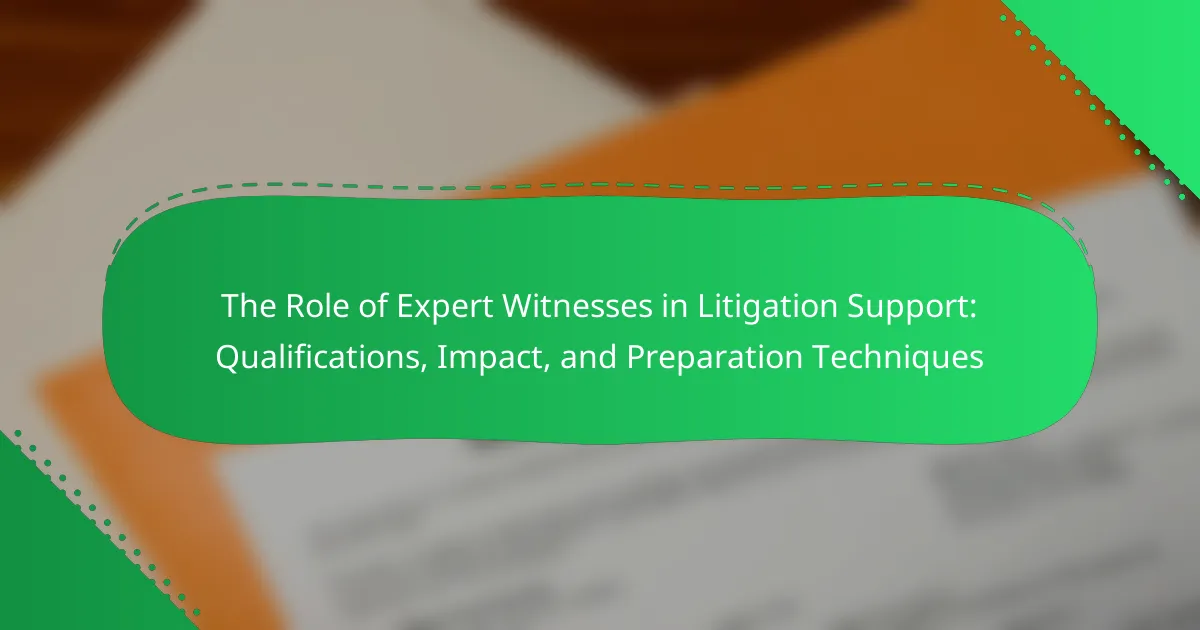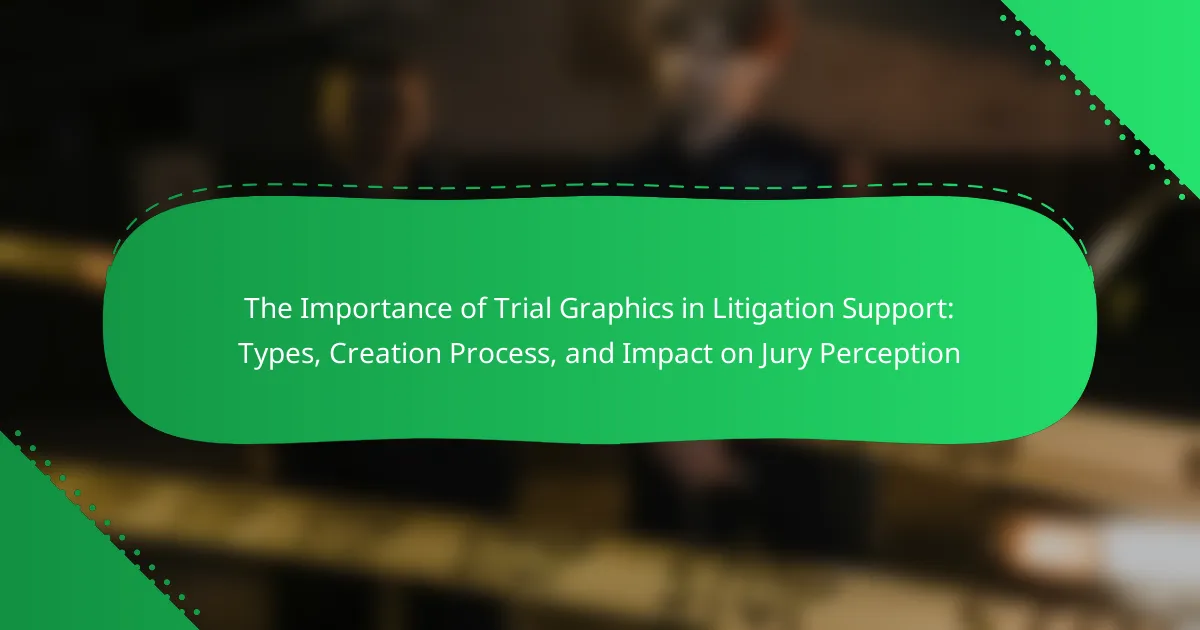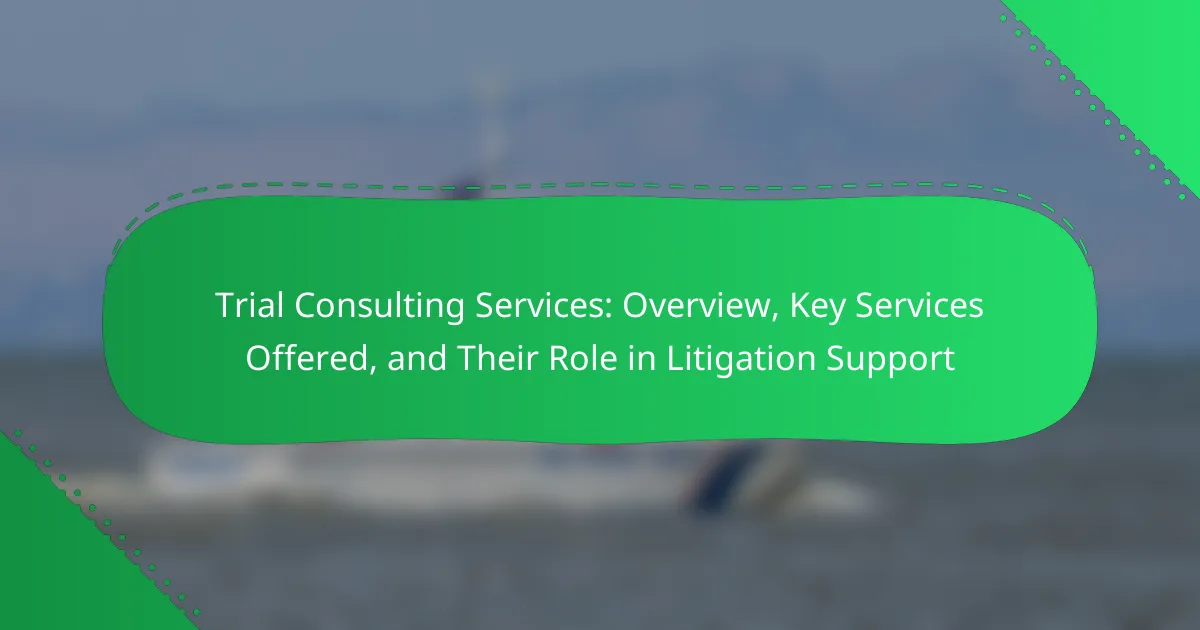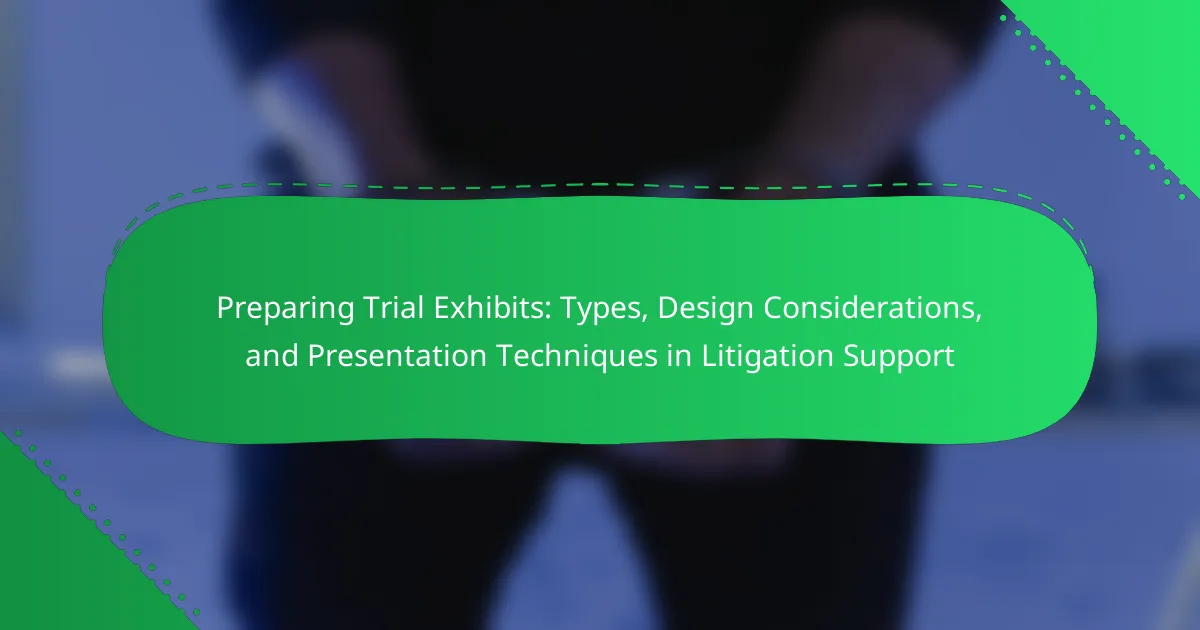Expert witnesses are specialized professionals who provide knowledge and opinions to support legal teams during litigation. Their ability to clarify complex technical issues significantly impacts the outcomes of cases, often leading to higher success rates. This article examines the qualifications required for expert witnesses, their influence on legal proceedings, and essential preparation techniques that enhance their effectiveness. Key aspects include the importance of thorough case review, structured presentation of findings, anticipation of opposing counsel’s questions, and continuous education in their respective fields. Understanding these elements is crucial for leveraging the expertise of expert witnesses in legal contexts.
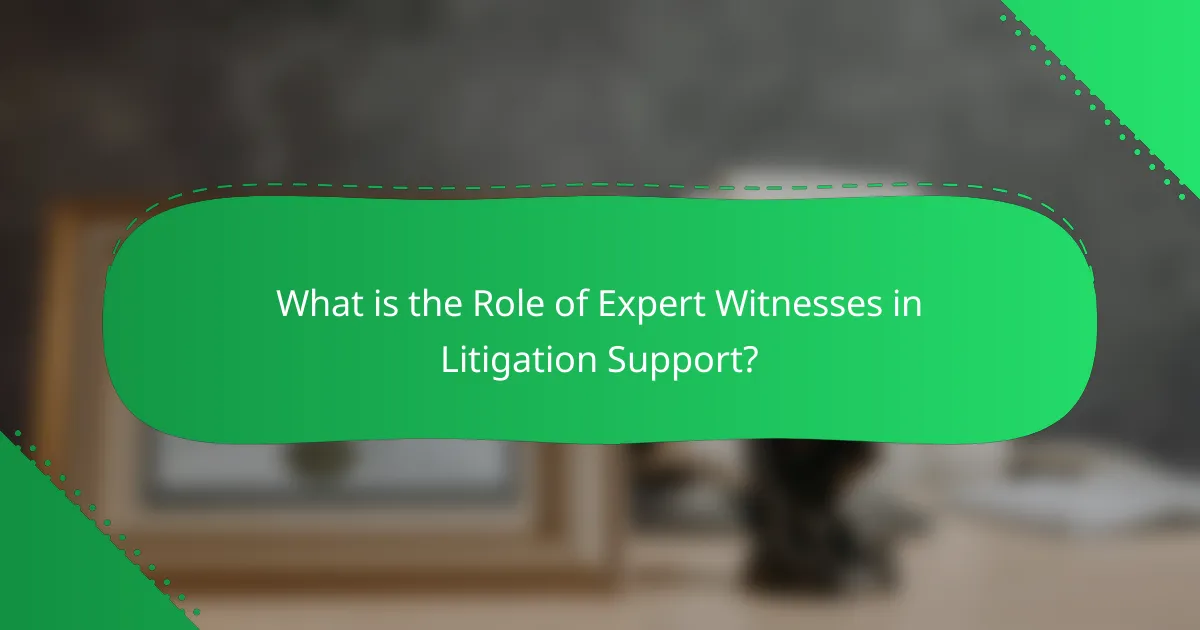
What is the Role of Expert Witnesses in Litigation Support?
Expert witnesses provide specialized knowledge and opinions in litigation support. They assist legal teams by evaluating evidence and offering expert testimony. Their insights can clarify complex technical issues for judges and juries. Expert witnesses are often called upon to lend credibility to a case. They are typically selected based on their qualifications and experience in a specific field. Their testimony can significantly influence the outcome of legal proceedings. Studies show that cases with expert witnesses often have higher success rates. Their role is critical in bridging the gap between technical information and legal understanding.
How do expert witnesses contribute to legal cases?
Expert witnesses contribute to legal cases by providing specialized knowledge and opinions. They help clarify complex issues for the court. Their testimony can influence the judge or jury’s understanding. Expert witnesses are often used in fields like medicine, engineering, or finance. They analyze evidence and offer insights based on their expertise. This can strengthen a party’s case significantly. Courts rely on their credibility and qualifications to assess the validity of claims. Their involvement can lead to more informed decisions in legal proceedings.
What specific functions do expert witnesses perform in litigation?
Expert witnesses perform critical functions in litigation. They provide specialized knowledge and opinions based on their expertise. This knowledge assists the court in understanding complex issues. Expert witnesses may prepare reports summarizing their findings. They often testify during trials to clarify their opinions. They also engage in depositions to provide insights before trial proceedings. Their role includes assisting attorneys in case strategy and preparation. Expert witnesses enhance the credibility of the evidence presented in court.
How do expert witnesses enhance the credibility of a case?
Expert witnesses enhance the credibility of a case by providing specialized knowledge and objective opinions. Their expertise is often based on extensive education and experience in a specific field. This specialized knowledge helps clarify complex issues for the court. Courts rely on expert witnesses to interpret technical data and evidence. Their testimony can influence the judge’s or jury’s understanding of the case. Studies show that cases with expert witnesses are more likely to result in favorable outcomes. For instance, a study by the National Center for State Courts found that expert testimony significantly impacted jury decisions. This underscores the importance of expert witnesses in enhancing the overall credibility of legal proceedings.
What qualifications are required for expert witnesses?
Expert witnesses must possess specialized knowledge in their field. This knowledge is typically gained through education, training, and experience. A relevant advanced degree is often required. Professional certifications may also enhance credibility. Additionally, expert witnesses should have practical experience in their area of expertise. They must be able to communicate their findings clearly in legal settings. Familiarity with legal procedures is beneficial. Courts often evaluate qualifications based on these criteria before accepting an expert witness.
What educational background is typically necessary for expert witnesses?
Expert witnesses typically require advanced education in their field of expertise. Most have a minimum of a master’s degree or doctorate. Fields may include medicine, engineering, finance, or law. Relevant professional experience is also crucial. This experience helps establish credibility and authority. Many expert witnesses hold licenses or certifications in their area. For instance, medical experts often have board certifications. Their educational background supports their ability to provide informed opinions in legal cases. This combination of education and experience is essential for effective testimony.
How do certifications and licenses impact an expert witness’s credibility?
Certifications and licenses significantly enhance an expert witness’s credibility. They serve as formal recognition of an individual’s expertise and qualifications in a specific field. Courts and legal professionals often regard certified experts as more reliable. This is because certifications typically require rigorous training and adherence to industry standards. For example, a certified forensic accountant may be viewed as more credible than one without certification. Additionally, licenses demonstrate compliance with legal and professional regulations. This compliance reassures the court about the expert’s legitimacy. Research shows that expert witnesses with relevant certifications are more likely to be favored in court. Their qualifications can influence jury perception and case outcomes.
Why is the selection of an expert witness crucial in litigation?
The selection of an expert witness is crucial in litigation because it significantly influences the case outcome. An expert witness provides specialized knowledge that can clarify complex issues for the judge and jury. Their credibility and qualifications can enhance the persuasiveness of the argument. A well-chosen expert can effectively communicate technical information in an understandable manner. Conversely, a poorly selected expert may undermine the case’s credibility. Studies show that juries often rely heavily on expert testimony when making decisions. Thus, selecting an expert with relevant experience and a solid reputation is essential for establishing trust. Overall, the right expert witness can be a decisive factor in the success of litigation.
What factors should attorneys consider when choosing an expert witness?
Attorneys should consider the expert witness’s qualifications, experience, and credibility. The expert’s educational background is crucial. Relevant certifications and licenses validate their expertise. Experience in the specific field enhances reliability. The expert’s previous testimony experience is also significant. Past courtroom performance can indicate effectiveness. Attorneys should assess the expert’s ability to communicate complex ideas clearly. Their reputation within the industry can influence the case’s perception. Finally, compatibility with the legal team’s strategy is essential for cohesive collaboration.
How does the expert witness’s experience influence case outcomes?
The expert witness’s experience significantly influences case outcomes. Experienced expert witnesses provide credible and reliable testimony. Their background often includes specialized knowledge relevant to the case. This expertise can help clarify complex issues for judges and juries. Research indicates that juries are more likely to trust testimony from seasoned professionals. A study by the American Bar Association found that expert credibility is linked to their experience level. Furthermore, an expert’s prior involvement in similar cases can enhance their persuasive power. Overall, the depth of an expert witness’s experience can be a decisive factor in the success of legal proceedings.
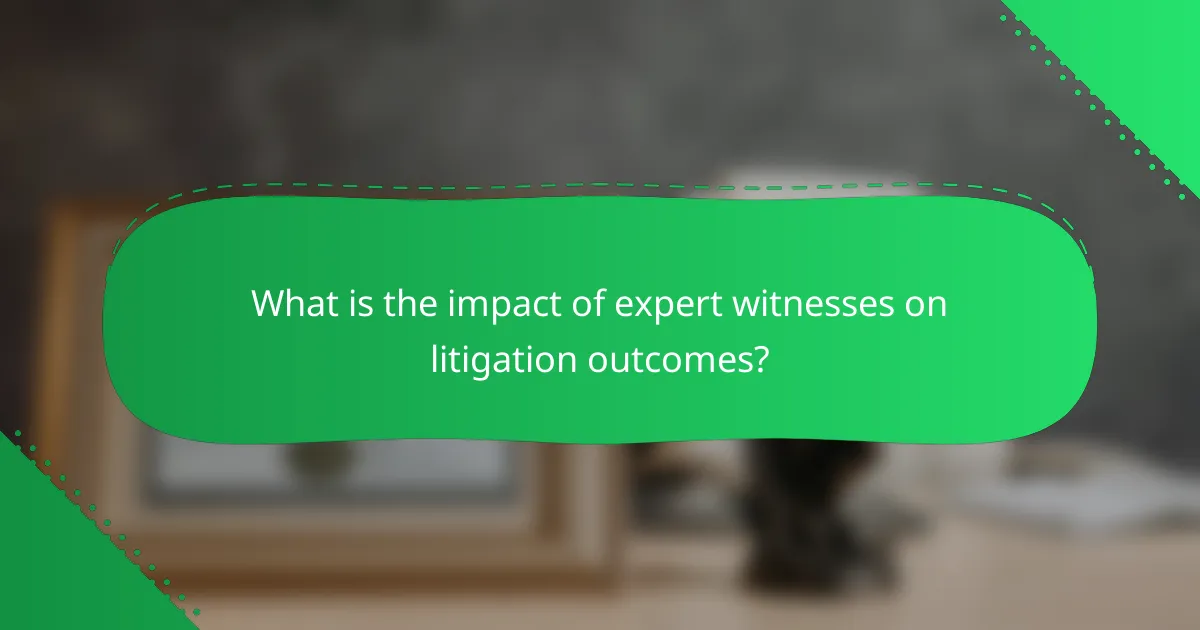
What is the impact of expert witnesses on litigation outcomes?
Expert witnesses significantly influence litigation outcomes. Their specialized knowledge can clarify complex issues for judges and juries. This clarity often sways decisions in favor of one party. Studies show that cases with expert testimony are more likely to reach favorable settlements. For instance, a report by the National Center for State Courts indicates that expert witnesses can increase the likelihood of winning a case by up to 50%. Their credibility and ability to communicate effectively enhance the persuasiveness of the arguments presented. Therefore, the presence of expert witnesses is a critical factor in shaping the results of legal proceedings.
How do expert witnesses affect jury decisions?
Expert witnesses significantly influence jury decisions by providing specialized knowledge. Their testimony helps jurors understand complex evidence. This understanding can shape jurors’ perceptions of the case. Research indicates that juries often rely on expert opinions to make informed decisions. A study published in the Journal of Forensic Sciences found that expert testimony can sway jurors’ beliefs about liability and damages. Additionally, expert witnesses lend credibility to the arguments presented by either party. Their qualifications and experience enhance the persuasive power of the evidence. Overall, expert witnesses play a crucial role in guiding jury deliberations and outcomes.
What role does expert testimony play in shaping jury perceptions?
Expert testimony significantly influences jury perceptions during trials. It provides specialized knowledge that can clarify complex issues. Jurors often rely on expert opinions to understand technical aspects of a case. This reliance can lead to a stronger belief in the credibility of the presented evidence. Studies show that jurors may favor cases supported by expert testimony over those without it. For instance, a study published in the “Journal of Empirical Legal Studies” found that jurors are more likely to side with the party presenting expert witnesses. This underscores the critical role expert testimony plays in shaping juror attitudes and decisions.
How can expert witnesses influence the settlement of a case?
Expert witnesses can significantly influence the settlement of a case by providing specialized knowledge and credible testimony. Their insights can clarify complex issues for judges and juries. This clarity often leads to more informed decision-making during negotiations. When parties recognize the strength of expert testimony, they may be more inclined to settle. The presence of a reputable expert can also enhance the perceived value of a case. Studies show that cases with expert witnesses often settle faster than those without. For instance, a study by the National Center for State Courts found that expert testimony can reduce trial duration by up to 30%. This efficiency can motivate parties to reach a settlement sooner.
What are the common challenges faced by expert witnesses in litigation?
Expert witnesses face several common challenges in litigation. These challenges include maintaining objectivity while under pressure from attorneys. They often encounter difficulties in communicating complex information clearly to judges and juries. Time constraints can hinder their ability to prepare adequately for cases. Expert witnesses may also face scrutiny regarding their qualifications and credibility. Conflicting opinions from other experts can complicate their testimony. Additionally, they must navigate the legal and procedural requirements of the court system. These factors can impact the effectiveness of their contributions to litigation.
How do expert witnesses prepare for cross-examination?
Expert witnesses prepare for cross-examination by thoroughly reviewing case materials. They analyze their reports and relevant evidence to ensure accuracy. They anticipate potential questions from opposing counsel. This involves identifying weaknesses in their testimony and preparing responses. Expert witnesses also practice their delivery with legal teams. This helps them maintain composure and clarity during questioning. They may participate in mock cross-examinations to simulate real courtroom scenarios. This preparation enhances their confidence and effectiveness as witnesses.
What strategies can expert witnesses use to effectively communicate their findings?
Expert witnesses can use clear language to effectively communicate their findings. They should avoid jargon and complex terminology. Simplifying concepts helps juries and judges understand the information. Visual aids can enhance comprehension. Charts, graphs, and models make data more accessible. Expert witnesses should also provide context for their findings. Explaining the relevance of their expertise strengthens their credibility. Engaging storytelling can make technical information more relatable. Practicing responses to potential questions prepares them for courtroom scenarios. These strategies improve the overall impact of their testimony.
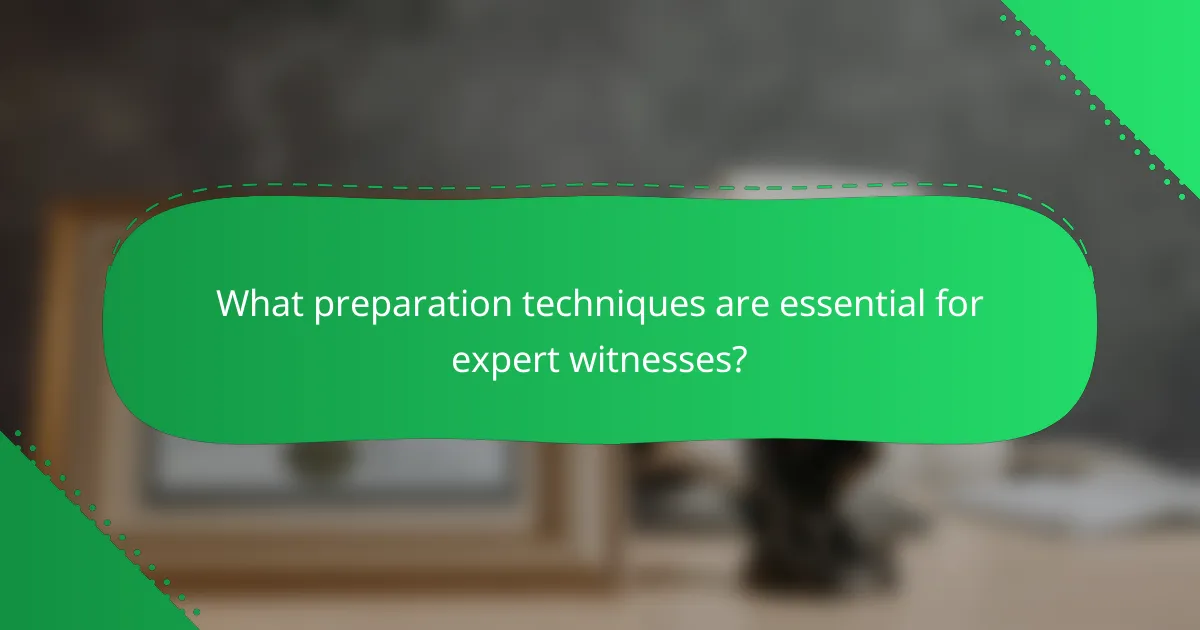
What preparation techniques are essential for expert witnesses?
Expert witnesses must utilize several essential preparation techniques. First, they should thoroughly review case materials. This includes understanding the facts, evidence, and legal issues involved. Next, expert witnesses should organize their findings clearly. A structured presentation of their analysis aids comprehension. Additionally, they must anticipate opposing counsel’s questions. This preparation allows them to respond confidently during cross-examination. Practicing testimony is also crucial. Rehearsing helps refine delivery and clarify complex concepts. Furthermore, staying updated on relevant developments in their field is essential. Continuous education ensures their expertise remains credible and current. Lastly, building rapport with legal teams enhances communication and collaboration. These techniques collectively enhance an expert witness’s effectiveness in litigation.
How should expert witnesses prepare for their role in litigation?
Expert witnesses should prepare thoroughly for their role in litigation. They need to review relevant case materials, including pleadings and discovery documents. Understanding the specific legal questions at hand is crucial. Expert witnesses should also familiarize themselves with the applicable standards and guidelines in their field. Practicing clear and concise communication of complex concepts is essential. They should anticipate potential questions from attorneys and opposing counsel. Conducting mock examinations can enhance their readiness. Maintaining objectivity and impartiality is vital throughout the process. Proper preparation can significantly impact the effectiveness of their testimony in court.
What steps should be taken to ensure thorough understanding of the case?
To ensure thorough understanding of the case, one must conduct a comprehensive review of all relevant documents. This includes examining pleadings, motions, and discovery materials. Engaging in discussions with legal counsel is essential for clarifying complex legal terms. Reviewing witness statements and expert reports provides additional context. Attending pre-trial meetings helps to align perspectives on case strategy. Participating in mock trials can enhance understanding of courtroom dynamics. Lastly, continuous research on applicable laws and precedents is crucial for informed decision-making. Each of these steps contributes to a well-rounded grasp of the case.
How can expert witnesses effectively organize their testimony?
Expert witnesses can effectively organize their testimony by structuring it logically and clearly. They should begin with an overview of their qualifications. This establishes credibility and context. Next, expert witnesses should outline the key points of their testimony. Each point should be supported by evidence or examples.
Using visual aids can enhance understanding. Charts or graphs can illustrate complex data. Additionally, expert witnesses should anticipate cross-examination questions. Preparing responses to potential challenges strengthens their position.
Finally, rehearsing the testimony ensures clarity and confidence. Studies show that organized presentations improve retention and comprehension. For instance, a well-structured testimony increases the likelihood of being persuasive in court.
What best practices should expert witnesses follow during litigation?
Expert witnesses should adhere to several best practices during litigation. They must maintain objectivity and neutrality in their assessments. This ensures their credibility and reliability in court. Clear communication is essential; they should present complex information in an understandable manner. Preparation is crucial; expert witnesses must thoroughly review case materials and relevant literature. They should also anticipate opposing counsel’s questions and prepare responses. Timeliness in submitting reports is important to meet court deadlines. Additionally, expert witnesses should keep detailed records of their methodologies and findings. This documentation supports their testimony and enhances their credibility.
How can expert witnesses maintain objectivity and credibility?
Expert witnesses can maintain objectivity and credibility by adhering to established ethical standards and guidelines. They should provide unbiased opinions based on their expertise and relevant evidence. Continuous education and training help them stay updated on industry standards and practices. Documenting their methodologies enhances transparency in their assessments. Maintaining professionalism in communication fosters trust with legal teams and the court. Expert witnesses should avoid conflicts of interest that could compromise their impartiality. By relying on peer-reviewed research, they can support their conclusions with credible evidence. These practices collectively reinforce their role as reliable sources in litigation.
What tips can improve the effectiveness of expert testimony?
To improve the effectiveness of expert testimony, experts should focus on clarity and simplicity. Clear communication helps juries and judges understand complex topics. Experts should avoid jargon and technical terms that may confuse the audience. Using relatable examples can illustrate points effectively.
Preparation is crucial for expert witnesses. They should review case materials thoroughly to understand the context. Experts must practice their testimony to enhance delivery and confidence. Engaging in mock trials can simulate real courtroom dynamics.
Establishing credibility is essential. Experts should highlight relevant qualifications and experiences. Providing peer-reviewed research or case studies can support their statements. This approach reinforces the reliability of the testimony.
Lastly, maintaining composure during cross-examination is vital. Experts should remain calm and focused to convey confidence. This demeanor can positively influence the perception of their testimony.
What resources are available for expert witnesses to enhance their skills?
Expert witnesses can enhance their skills through various resources. Professional organizations offer training and certification programs. For example, the American Academy of Expert Witnesses provides educational workshops. Online courses from platforms like Coursera and LinkedIn Learning cover relevant topics. Books on expert testimony and courtroom procedures serve as valuable references. Networking with other experts allows for knowledge sharing and mentorship. Attending legal seminars keeps witnesses updated on industry trends. Engaging in mock trials provides practical experience. These resources collectively support expert witnesses in refining their skills and effectiveness.
Which training programs or workshops are recommended for expert witnesses?
Recommended training programs for expert witnesses include the National Association of Legal Assistants (NALA) workshops and the American Academy of Forensic Sciences (AAFS) conferences. These programs focus on enhancing skills relevant to testimony and legal procedures. Additionally, the Expert Institute offers specialized courses for expert witness preparation. The American Bar Association (ABA) also provides resources and training focused on legal standards for expert testimony. These organizations are recognized for their credibility in the legal field. Participation in these programs can significantly improve an expert witness’s effectiveness in court.
How can expert witnesses stay updated on legal and industry developments?
Expert witnesses can stay updated on legal and industry developments by engaging in continuous education. They should attend relevant seminars and workshops to gain insights into new laws and practices. Subscribing to legal journals and industry publications is also essential for receiving the latest information. Networking with other professionals in their field allows for knowledge sharing and updates. Participating in online forums and discussion groups can provide real-time information about changes in the legal landscape. Additionally, expert witnesses should follow reputable legal blogs and podcasts for ongoing education. Engaging with professional associations can offer access to resources and training opportunities. These methods ensure expert witnesses remain informed and relevant in their field.
The main entity of this article is expert witnesses in litigation support. The article provides a comprehensive overview of their role, qualifications, and impact on legal proceedings. It discusses how expert witnesses contribute specialized knowledge to clarify complex issues, enhance case credibility, and influence jury decisions. Key preparation techniques and strategies for effective communication are also outlined, emphasizing the importance of maintaining objectivity and credibility. The article highlights the significant influence expert witnesses have on litigation outcomes and the factors attorneys should consider when selecting them.
